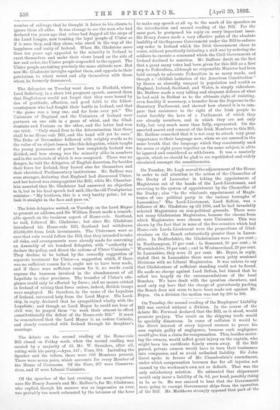The Irish delegates waited, on Tuesday, on the Lord Mayor
to present an address, and Sir William Ewart made a remark- able speech on the business aspect of Home-rule. Scotland, he said, followed Mr. Gladstone ; but since Mr. Gladstone introduced his Home-rule Bill, Scotland had withdrawn 23,000,000 from Irish investments. The Ulstermen were so sure that ruin would follow the Bill, that they intended to take all risks, and arrangements were already made for convening an Assembly of six hundred delegates, with " authority to declare the policy, and direct the actions of Ulster Unionists." They decline to be bribed by the cowardly suggestion of separate treatment for Ulster—a suggestion which, if there was no sufficient reason for it, ought not to have been made, and if there were sufficient reason for it, no words could express the baseness involved in the abandonment of all Loyalists in other provinces. The transfer of Ulster's alle- giance could only be affected by force; and no means existed in Ireland of raising that force unless, indeed, British troops were employed. He therefore, in the name of the Loyalists of Ireland, entreated help from the Lord Mayor. His Lord- ship, in reply, declared that he sympathised wholly with the Loyalists ; and though as Lord Mayor he could not hear of civil war, he prayed them " to work their utmost to effect constitutionally the defeat of the Home-rule Bill." It must be remembered that the Lord Mayor is an ardent Catholic, and closely connected with Ireland through his daughter's marriage.


















































 Previous page
Previous page